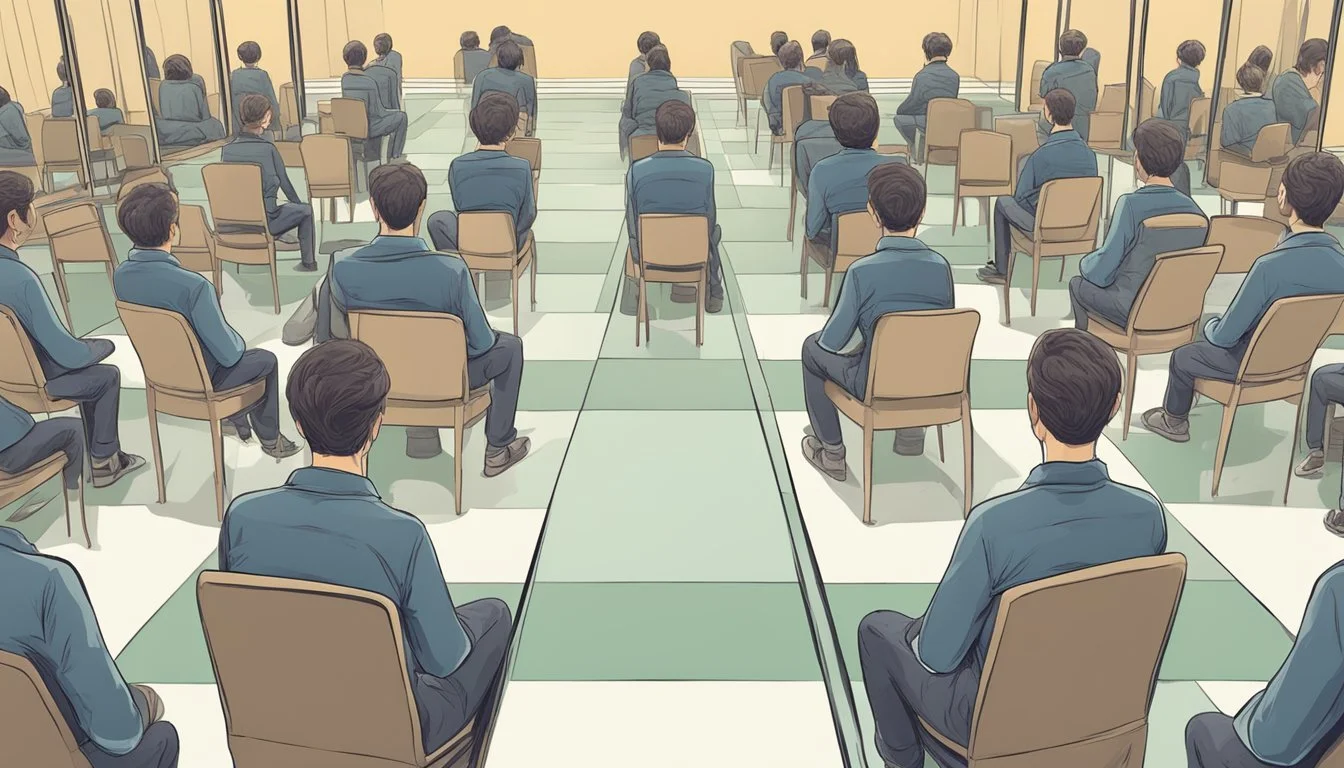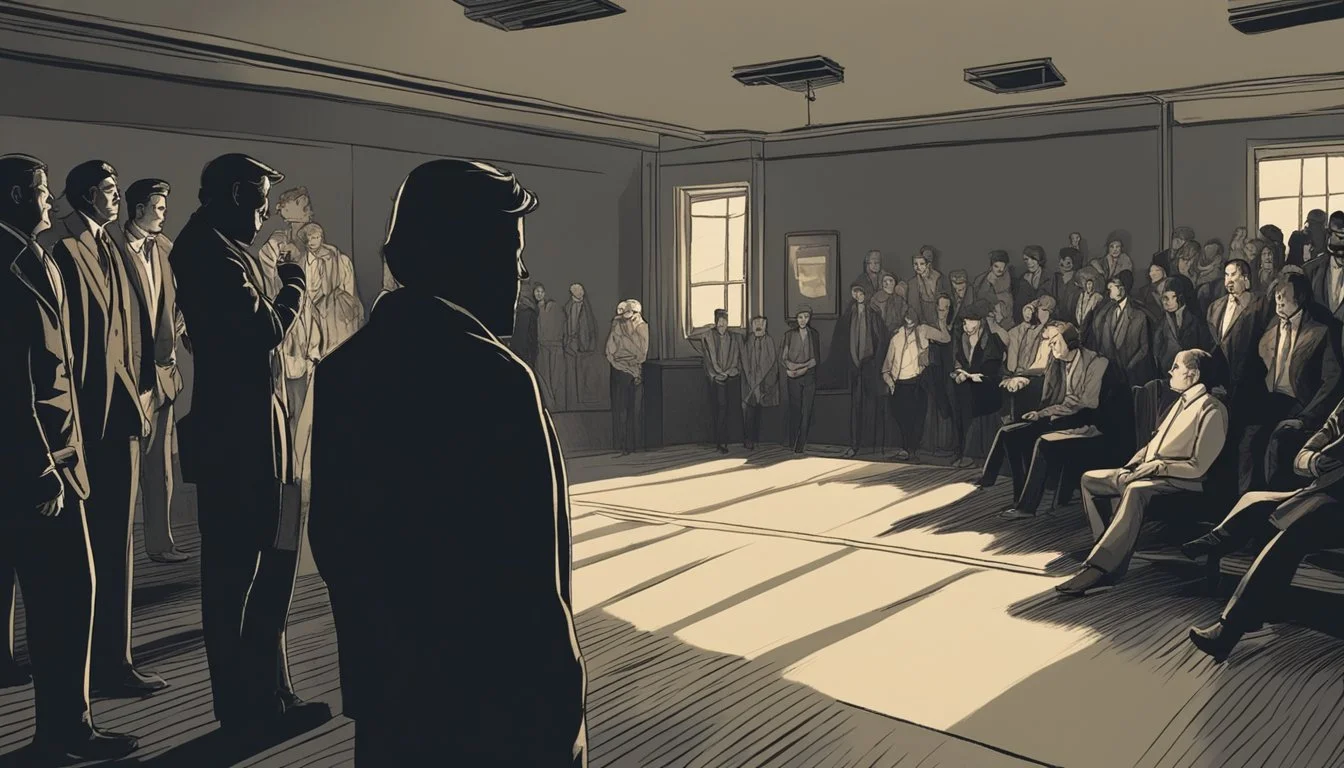8 Reasons Why Narcissists Often Struggle with Paranoia
Unveiling the Connection
Narcissists often struggle with paranoia, a condition marked by exaggerated self-importance and hypersensitivity to external threats. This can lead to behaviors and attitudes that may seem contradictory or confusing to those around them.
Understanding these behaviors helps in grasping why narcissists might feel overly suspicious or defensive. This article explores eight reasons behind the complex relationship between narcissism and paranoia, shedding light on the underlying psychological dynamics.
1) Lack of Trust in Others
A pervasive lack of trust in others is a core characteristic of narcissistic paranoia. Narcissists often believe that others are out to get them or have ulterior motives. This mindset leads to constant suspicion and vigilance.
Their inability to trust stems from their need to maintain a false image. Narcissists fear that others will see through their facade and expose their vulnerabilities. This fear makes them wary of everyone around them.
Rigid thinking patterns also contribute to their paranoia. Narcissists view matters in binary terms, seeing people as either allies or enemies. This black-and-white perspective prevents them from establishing genuine relationships.
Additionally, narcissists often project their own untrustworthy behavior onto others. Their tendency to bend rules and manipulate situations leads them to assume that others will do the same. This belief reinforces their distrustful attitudes.
For more insights, you can read about these behaviors in more detail on Inner Toxic Relief.
2) Fear of Exposure
Narcissists often harbor a deep fear of exposure. This fear stems from their attempts to project an image of superiority and flawlessness. Underneath this exterior, they believe they are deeply flawed, illegitimate, and ordinary.
The potential for exposing these vulnerabilities can trigger extreme paranoia. They may be hypersensitive to criticism or perceived threats to their reputation. This hyper-awareness can lead to defensive and hostile behaviors.
Public humiliation is a particular terror for narcissists. They dread scenarios where their inadequacies might be revealed in front of others. This fear often drives them to go to great lengths to manage their image and avoid situations where they might be judged.
Their sense of self-worth is intricately tied to external validation. If they suspect that their true selves might be revealed, it can create intense anxiety and paranoia. This often results in an exaggerated response to minor issues, as they aim to preserve their constructed identity.
Narcissists’ fear of exposure is closely linked to their inability to trust others. They constantly worry that someone might uncover their imperfections. This lack of trust can lead to isolation and further paranoid tendencies, as they struggle to maintain their facade.
3) Extreme Sense of Vulnerability
Narcissists often have an extreme sense of vulnerability that significantly contributes to their paranoia. This vulnerability stems from a fragile ego and a deep-seated sense of inadequacy, which makes them highly hypersensitive and defensive.
Their fear of being exposed for their flaws and failures drives a need to maintain an illusion of superiority. They are terrified that any sign of weakness or mistake will shatter this carefully constructed self-image.
Vulnerable narcissists, who often exhibit introversion masking insecurities, rely heavily on external validation to feel good about themselves. Their constant need for approval leaves them anxious and suspicious of others’ intentions, further fueling their paranoid tendencies.
This hypersensitivity can manifest in rigid and binary thinking. They see the world in black and white, which compounds their inability to trust and acknowledge others' perspectives.
The constant fear and sense of being under scrutiny can push them to become excessively controlling. They may micromanage situations and relationships, attempting to prevent any scenario that might reveal their perceived inadequacies.
These combined traits create a toxic mindset where the narcissist is always on guard, ready to defend against any perceived threat to their fragile ego. This can lead to strained relationships and unhealthy interactions.
4) Compensatory Behavior
Narcissists often engage in compensatory behavior to mask deep-seated insecurities. This behavior arises from their need to maintain a grandiose self-image, especially when confronted with their shortcomings.
They display exaggerated confidence and superiority. These actions serve to shield them from internal vulnerabilities and perceived threats to their self-worth.
Additionally, narcissists may resort to manipulation and control over others. By doing so, they feel a sense of power, reducing the anxiety that fuels their paranoia.
In relationships, this compensatory behavior can manifest as constant validation-seeking. Narcissists rely on external affirmation to sustain their inflated self-image, avoiding introspection about their flaws.
These behaviors are often rigid and inflexible. The inflexibility helps them maintain a sense of order and predictability, crucial in managing their anxious tendencies.
Further, narcissists might project their insecurities onto others. By attributing their flaws to someone else, they divert attention from their own deficiencies.
In essence, these compensatory tactics are mechanisms for narcissists to cope with their paranoia. They build a protective barrier against any perceived threats to their fragile self-esteem.
5) Hyper-Sensitivity to Criticism
Narcissists often display a hyper-sensitivity to criticism. This is largely because they have an inflated sense of self-importance and demand excessive admiration. Even the slightest hint of criticism can be perceived as a direct attack on their worth.
Highly sensitive narcissists are known to react negatively to reasonable critiques. They often become defensive or lash out as they cannot tolerate questioning of their self-image. This reaction stems from an underlying insecurity masked by their grandiose self-view.
A person with vulnerable narcissism, a subtype of narcissism, is especially prone to being hypersensitive to rejection and criticism. They often get angry when not validated or placed on a pedestal, revealing their fragile self-esteem.
Some may show empathy; however, it’s usually self-serving. Their so-called empathy aims to garner approval from others, further feeding their need for validation. The slightest critique disrupts this self-serving cycle, leading to paranoia.
Their need for constant validation and admiration makes any form of criticism particularly hard to handle. This hyper-sensitivity often manifests in paranoid behavior, as they constantly fear being judged or exposed.
Hyper-sensitivity to criticism is a defining trait that makes narcissists particularly challenging to interact with, often leading to strained relationships.
6) Distorted Reality Perception
Narcissists often exhibit a marked distortion in their perception of reality. This distortion can manifest as denial, where they refuse to acknowledge any flaws or mistakes they make. In their minds, errors and faults are either someone else's fault or non-existent.
Another common form involves minimization, where they downplay their negative behaviors. For example, a narcissist might insist that their hurtful comments were "just jokes" or "not a big deal," despite the evident pain they cause others.
Justification is frequently employed by narcissists to reshape events in their favor. They might justify harmful actions by claiming they were forced to act that way due to others’ behaviors, twisting situations to absolve themselves of responsibility.
In some cases, narcissists might use negation to entirely reject realities that contradict their self-image. They might deny saying something hurtful or even construct false narratives to maintain their idealized view of themselves.
The reversal tactic is also prevalent. Narcissists can accuse others of the very behaviors they exhibit. This serves to divert attention and create confusion, making it harder for others to pinpoint the real issue.
These techniques strain relationships and obscure the truth. The reality perceived by those around them becomes muddied, as narcissists expertly manipulate perceptions to their advantage. This ensnares others in their skewed view, complicating the distinction between fact and illusion.
7) Need for Control
Narcissists often have a profound need for control in their relationships and environments. This need stems from their desire to maintain their inflated sense of self-importance.
When situations arise that threaten their perceived control, their paranoia can intensify.
The need for control is closely linked to an inability to trust others. Narcissists may constantly monitor people around them, suspecting that others are plotting against them or undermining their authority.
This distrust can make them hypersensitive to any perceived slight or challenge to their control.
Rigid thinking patterns contribute to their control issues. They see things in black and white terms, believing they are either completely in control or entirely powerless. This binary thinking can make them react strongly to even minor challenges to their authority.
Because they cannot acknowledge or process their fears and insecurities, they externalize these feelings, often attributing malice or deceit to those around them. This projection exacerbates their paranoia, as they feel threatened by imaginary enemies.
8) Projection of Own Paranoia
Narcissists often engage in projection, a defense mechanism where they attribute their own feelings and insecurities to others. This helps them avoid facing their flaws or vulnerabilities.
They project their internal paranoia onto those around them, interpreting benign actions or words as hostile or threatening. This misattribution further fuels their distrust and sense of victimization.
Through this projection, narcissists can maintain a belief that the world is against them. This reinforces their need for control and dominance over others.
By projecting their own paranoia, they shift the focus away from their issues, creating a reality where they are constantly under attack. This cycle perpetuates their paranoid thinking and behaviors.
Their inability to self-reflect exacerbates this mechanism. They struggle to see their role in conflicts or misunderstandings, inevitably blaming external sources for their discomfort.
Projection serves as a protective shield, allowing them to deflect blame and responsibility. This behavior is deeply ingrained and difficult to change, further complicating relationships and interactions with others.
For more on this dynamic, see the discussion of projection in narcissists at Carlacorelli.com.
Understanding Narcissistic Personality Disorder
Narcissistic Personality Disorder (NPD) involves a pattern of self-aggrandizing behaviors, a lack of empathy, and an intense need for admiration. This disorder affects various aspects of an individual's life, including relationships and self-esteem.
Core Characteristics of Narcissism
NPD is marked by several distinctive traits. Individuals may exhibit an overblown sense of self-importance, constantly seeking attention and validation. They often possess a grandiose perception of their abilities and achievements, expecting special treatment from others.
Empathy is notably deficient. They struggle to recognize or care about the feelings and needs of others, which hampers their ability to maintain healthy relationships. Additionally, they often react strongly to criticism, perceiving it as a threat and responding with anger or disdain.
These individuals might also project an air of arrogance and superiority, believing they are unique and should only associate with similarly "special" people.
How Narcissistic Traits Develop
The development of narcissistic traits is often traced back to early childhood experiences. Some theories suggest that excessive pampering or excessive criticism during formative years plays a critical role. Children who receive disproportionate amounts of either can develop an inflated self-image.
Parental behavior is also crucial. Parents who prioritize their needs over their children's or who set unrealistic expectations can foster narcissistic tendencies. This creates an environment where the child learns to equate personal value with external achievements and approval.
Biological factors might also play a part. Genetic predispositions combined with environmental influences can lead to NPD, further complicated by individual experiences and trauma throughout life. This intersection of factors contributes to the complex nature of the disorder.
The Link Between Narcissism and Paranoia
Narcissism and paranoia are closely interlinked, primarily due to narcissists' hypersensitivity to criticism and their constant need to maintain a facade of superiority. This relationship manifests in various psychological mechanisms and has been observed in numerous clinical settings.
Psychological Mechanisms at Play
Narcissists often exhibit hypersensitivity to criticism. They perceive any form of critique as a personal attack, which fuels their paranoid tendencies. This hypersensitivity can lead to a constant state of vigilance, where they are always on the lookout for perceived threats to their self-image.
Another key factor is their rigid thinking patterns. Narcissists tend to think in binary terms—situations and people are either entirely good or entirely bad. This black-and-white thinking exacerbates their paranoia, as they cannot integrate mixed information into a cohesive understanding.
The inability to trust others also plays a significant role. Due to their hyperfocus on maintaining a flawless image, narcissists suspect that others are as manipulative and untrustworthy as they are. This mistrust further amplifies their paranoia, leading to a defensive and often aggressive stance towards others.
Case Studies and Clinical Observations
Clinical observations show that narcissists often have an exaggerated sense of privilege. This makes them believe that they deserve special treatment, and when this expectation is unmet, they become suspicious of the motives and actions of others.
Behavioral patterns observed in therapy sessions reveal that narcissists frequently resort to conspiracy theories. These theories provide a convenient explanation for their constant feelings of persecution and help them maintain their inflated self-image.
In therapy, professionals have noted that narcissists’ lack of introspection prevents them from recognizing their own contributions to conflicts. This externalization of blame leads to further paranoia, as they view others as threats to their grandiose self-perception.
For more detailed information, refer to the Inner Toxic Relief and Psychology Today articles that discuss these dynamics extensively.
Impact of Paranoia on Relationships
Paranoia can significantly affect the dynamics of relationships for narcissists, leading to strained interactions and trust issues. This section examines how paranoia manifests in interpersonal dynamics and the crucial role trust issues play.
Strained Interpersonal Dynamics
Paranoia often leads to heightened suspicion and distrust in relationships. Narcissists may frequently interrogate their partners or friends, questioning their loyalty and intentions. This constant scrutiny creates a tense atmosphere, making genuine connection and communication difficult.
Moreover, the narcissist's need to control the narrative exacerbates these tensions. They may resort to manipulation or gaslighting to maintain their perceived dominance, further eroding the quality of the relationship.
Misinterpretations of innocent actions as threats or betrayal are also common. The narcissist's exaggerated reactions to perceived slights or betrayals can escalate minor disagreements into significant conflicts. This cycle of conflict undermines stability and peace in the relationship, often leading to its eventual breakdown.
The Role of Trust Issues
Trust is foundational to any relationship, yet paranoia severely hampers the ability to trust. Narcissists with paranoia are often unwilling to believe in the genuineness of their partners' or friends' actions. This distrust stems from their pervasive fear of being exploited or hurt.
Their fear of vulnerability further complicates trust issues. Narcissists view vulnerability as a weakness and may employ defensive mechanisms to shield themselves. This often results in emotional distance, where genuine intimacy and openness are replaced by guarded interactions.
Trust issues also manifest in the narcissist's reluctance to share personal thoughts or feelings. The fear that others might use their vulnerabilities against them leads to secrecy and isolation, compounding the difficulties in forming deep, meaningful connections.





